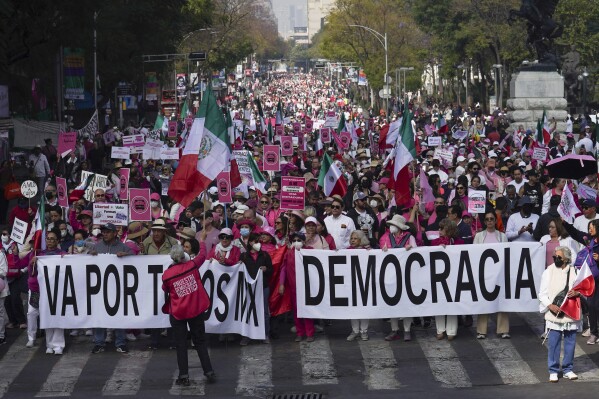Mexico City: In a display of dissent and determination, thousands of demonstrators clad in pink took to the streets of cities across Mexico and abroad, uniting under the banner of a march for democracy. Their target: the country’s ruling party, as Mexico prepares for pivotal elections on June 2.
The Sunday demonstrations, organized by Mexico’s opposition parties, echoed calls for transparent electoral processes and decried rampant corruption, coinciding with the official announcement of presidential front-runner Claudia Sheinbaum’s candidacy under the ruling party Morena.
Watch Video
While Sheinbaum is viewed as a continuation candidate of Mexico’s popular leader, Andres Manuel López Obrador, critics argue that his presidency has posed threats to the nation’s democratic principles. López Obrador’s actions, including budget cuts to the National Electoral Institute and attacks on the judiciary and media, have fueled concerns about the erosion of democratic norms.
In Mexico City, the epicenter of the protests, throngs of pink-clad demonstrators converged in the main plaza, chanting slogans demanding López Obrador’s removal and asserting the power of the people over entrenched elites. Among them was Gabriel Ozuna, who traveled from Baja California to advocate for diverse political representation and protest against violence targeting candidates by drug cartels.
Watch Video
The protests, organized by a coalition of opposition groups including the National Civic Front and Citizen Power, underscore the deepening divide over the future direction of Mexico’s democracy. Enrique de la Madrid Cordero, a prominent politician from the Institutional Revolutionary Party (PRI), emphasized the pivotal role of democratic participation in addressing societal challenges.
Despite the widespread mobilization, López Obrador remains a formidable force in Mexican politics, with his ally Sheinbaum maintaining a significant lead in polls. The president, in response to the protests, dismissed their legitimacy during a recent press briefing, questioning the organizers’ commitment to democratic values.
As the electoral landscape evolves and tensions simmer, the pro-democracy marches serve as a poignant reminder of the ongoing struggle to uphold democratic principles amidst political polarization and power struggles.
Key Points of this News
- Mass Demonstrations: Thousands of demonstrators, clad in pink attire, took to the streets in cities across Mexico and abroad to protest against the ruling party and advocate for democracy ahead of the country’s June 2 elections.
- Opposition to Ruling Party: The march targeted Mexico’s ruling party, Morena, amidst concerns over corruption and a perceived erosion of democracy, particularly following the announcement of presidential front-runner Claudia Sheinbaum’s candidacy.
- Controversies Surrounding López Obrador: President Andrés Manuel López Obrador, although popular for his advocacy for the working class, has faced criticism for actions perceived to undermine democracy. These include slashing funding for the National Electoral Institute and making moves against journalists and the judiciary.
- Symbolism of Pink: Demonstrators adopted the color pink, associated with the National Electoral Institute, as a symbol of their resistance against perceived threats to democracy.
- Calls for Participation: Protesters emphasized the importance of citizen participation in defending democracy and advocating for a variety of candidates to have a chance in the upcoming elections.
- Opposition Organizations: Various opposition groups, including the National Civic Front, Yes for Mexico, Citizen Power, Civil Society Mexico, UNE Mexico, and United for Mexico, participated in the marches.
- International Support: Demonstrations were not limited to Mexico, with marches organized in numerous cities across the United States and Spain, reflecting international concern over the state of democracy in Mexico.
- Sheinbaum’s Lead in Polls: Despite the protests, Claudia Sheinbaum, seen as a continuation candidate of López Obrador, maintains a significant lead in polls over her closest competitor, Xóchitl Gálvez.
- President’s Response: President López Obrador criticized the protests during a press briefing, suggesting that organizers were defending corruption rather than democracy, despite their claims to the contrary.



